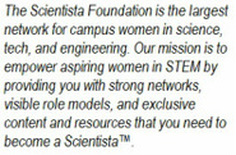|
By Alison Liou Science classes are some of most rewarding classes that you will take in college. At the same time, science classes may also be some of the toughest classes that you will take. In addition to the typical readings, lectures, and discussions that most classes have, there are also problem sets and labs to worry about—not to mention that sometimes the material itself feels completely in-over-your-head. But there is no reason to be discouraged! The following tips will put you on track to ace whatever science class you take. #1) Do Practice Problems Learning science is not just memorizing facts—it is learning how to apply scientific knowledge to novel situations. Practice problems, by providing you with a slew of novel situations, give you the opportunity to process and organize new material in your head, which allows you to gain a deeper understanding of the subject. Practice problems can also inform you of what areas you need more work on. Check to see if your professors have practice problems on hand. If not, practice problems can often be found in textbooks and even online. #2) Go to Office Hours Going to office hours will allow you to get to know your professors and teaching staff better since the smaller group setting allows for more one-on-one and in-depth conversations. Why would you want to get to know your professors or teaching staff better? They often make great mentors and are good people to learn from. Office hours are also a more appropriate and less intimidating setting than say, a lecture hall, for asking questions. What if you are afraid of approaching your professor or are worried that your professor will think your questions are dumb? There really is no reason to be afraid or worried. Professors will see that you care about the class if you are asking them questions and showing that you are eager to learn the material. These kinds of students are often their favorite students. #3) Form a Peer Study Group Peer study groups are great for discussion and going over material (or homework if collaboration is allowed). Peer study groups are great because they make studying a lot more fun by provide a setting for bouncing ideas off of each other and helping each other out. Many students find that this collaborative atmosphere is a great way to learn and a great bonding experience. Don’t know how to form a study group? Just go ahead and ask around. Chances are that you will easily find someone who would love to work with you. #4) Ask Questions Don’t be afraid to ask questions! Science and learning is all about being inquisitive and taking initiative. If you don’t understand something, just ask. If you want to learn more about something, just ask. No one has any reason to judge you. #5) Take Time to Digest the Material New concepts and information take time to sink in. Oftentimes, this means spending time with yourself, contemplating the material, going over the material multiple times, and making the material make sense for yourself. So don’t worry if you don’t pick up on new concepts right away or if it takes you a while to finally understand a concept! Learning takes time, and the amount of time it takes to learn something is different for everyone. What’s most important is that you take the necessary time to make sure you’ve truly learned the material. #6) Take Advantage of ALL Resources Don’t limit yourself to just the mandatory lectures and course readings. Seek out different sources in the library or online—you may find that some sources are easier to understand than others. Using a variety of sources is also a good way to broaden your knowledge. If a course is based strongly off of specific readings or textbooks though, be sure to focus on those sources and use other sources as supplements. #7) Fixate on Learning, Not Grades One of the easiest things to forget when taking classes (especially classes with very competitive students) is that you are taking the classes to learn—not just to get good grades. This piece of advice can be difficult to internalize when we seem to be judged by our GPAs everywhere, but the most valuable aspect we gain from the classes we take is knowledge—knowledge is what will define our capabilities and carry us through life. Studies have also shown that “intrinsic” motivation, such as the desire to learn, is more effective than “extrinsic” motivation, such as grades, in the learning process. All the more reason to stop obsessing over those test scores! #8) Be Confident in your Abilities What if you are feeling a little shy because your science class is male-dominated? Shed the shyness because as Ada Etil Yonath, a winner of the 2009 Nobel Prize in Chemistry, put it, “science is gender-independent”. You shouldn’t feel the need to prove your worth because you are a woman in science. What matters is what you bring to the table—your hard work, your passion, your willingness to stand strong through difficult times, and your confidence in your abilities. #9) Enjoy the Class! Enjoy the class because you will do better and be happier in a class that you appreciate. Sources: http://www.nature.com/nature/journal/v478/n7368_supp/full/478S6a.html http://www.apa.org/research/action/success.aspx Photo Credit: http://www.freedigitalphotos.net/images/view_photog.php?photogid=1499
0 Comments
Your comment will be posted after it is approved.
Leave a Reply. |
Education BlogAbout ScientistaSubscribe!NEW!New PostsWhat's HotClick to set custom HTML
You Might Like...
Connect With UsLatest tweets |
The Scientista Foundation, Inc. All Rights Reserved © 2011-2021 | Based in NY | [email protected]
The Network for Pre-Professional Women in Science and Engineering
The Scientista Foundation is a registered 501(c)(3) -- Donate!
The Network for Pre-Professional Women in Science and Engineering
The Scientista Foundation is a registered 501(c)(3) -- Donate!



 RSS Feed
RSS Feed









